Key takeaways:
- Mindful snacking enhances the eating experience by encouraging presence and awareness, helping individuals appreciate flavors and textures, which can reduce overeating.
- Practical strategies for mindful eating include eliminating distractions, engaging all senses, and practicing portion control to create a fulfilling snacking routine.
- Reflecting on snacking habits helps identify emotional triggers and patterns, empowering individuals to make healthier choices and develop a more positive relationship with food.
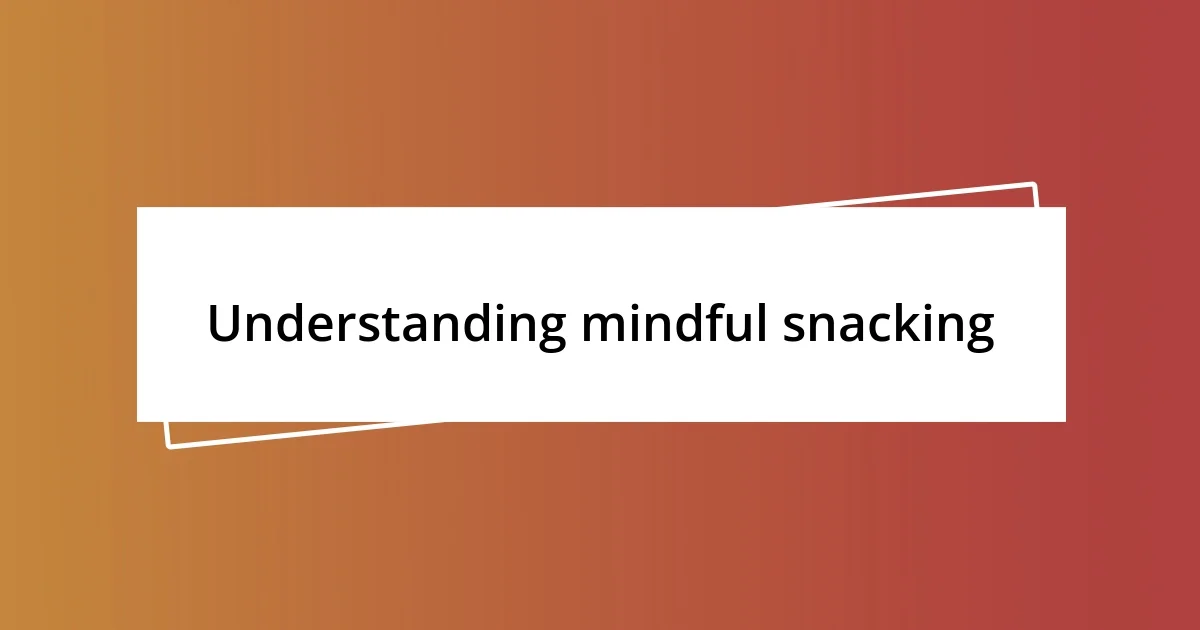
Understanding mindful snacking
Mindful snacking is all about being present with your food. I remember a time when I mindlessly munched on chips while scrolling through my phone. It was only after the bag was empty that I realized I hadn’t even tasted them. Have you ever found yourself finishing a snack without really experiencing it? That’s the essence of mindful eating—taking time to savor each bite rather than rushing through it.
When we approach snacking with mindfulness, it transforms how we interact with food. For me, choosing a piece of fruit instead of a processed snack became a revelation. I started to appreciate the vibrant colors, the fresh smell, and the satisfying crunch. This kind of awareness turns a simple act of eating into an enjoyable ritual rather than just a break in the day.
Additionally, I find that emotional triggers often influence our cravings. Have you noticed how stress can lead to a sudden urge for comfort food? By acknowledging these feelings instead of just acting on them, I’ve found it easier to choose snacks that nourish rather than just fill a void. Mindful snacking encourages us to ask why we’re reaching for food and helps create a healthier relationship with what we consume.
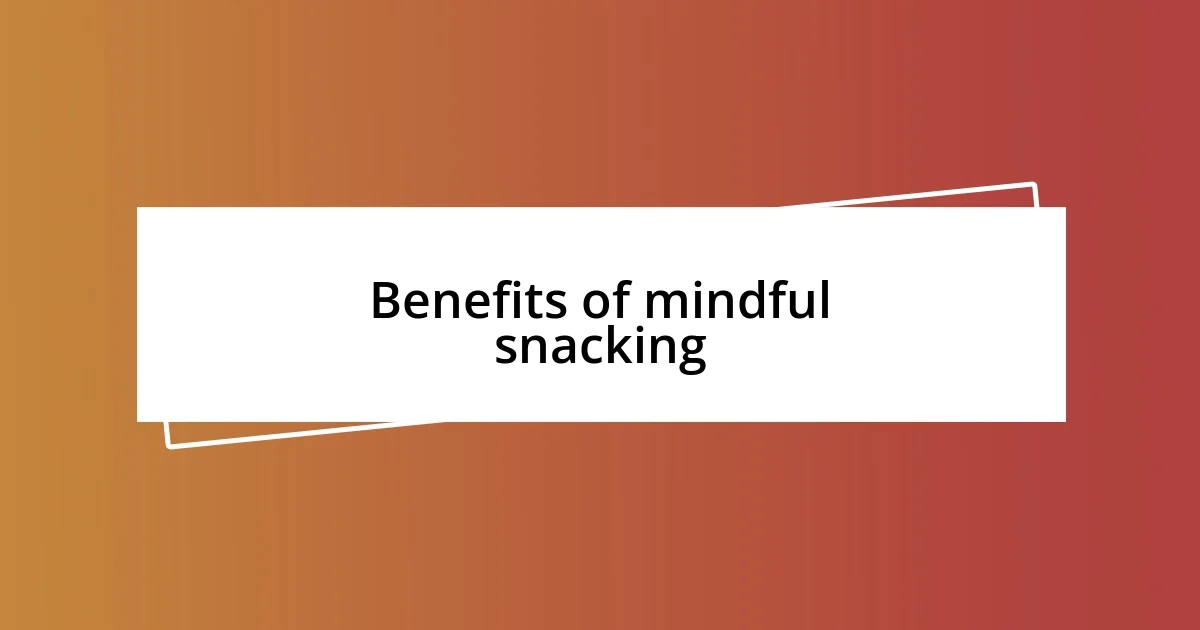
Benefits of mindful snacking
When I started practicing mindful snacking, I was pleasantly surprised by the benefits that unfolded. I discovered that being present while eating helped me to truly appreciate flavors and textures. One afternoon, I slowly enjoyed a handful of almonds, noticing how their warm richness lingered on my palate. The more I savored my snacks, the less inclined I felt to overindulge. This shift allowed me to feel satisfied with smaller portions and made my choices more intentional.
The positive impact of mindful snacking extends beyond our relationship with food. Here are some of the benefits I’ve personally experienced:
- Improved digestion: I noticed my body felt more at ease after meals since I was taking the time to chew my food thoroughly.
- Heightened awareness: Being conscious of my food choices empowered me to opt for nutritious snacks over processed ones.
- Increased satisfaction: By savoring each bite, I found myself enjoying my snacks more, reducing the urge to binge.
- Stress reduction: Focused snacking became a soothing practice, offering a moment of calm in my hectic day, like a little meditation session.
- Better emotional regulation: I began to recognize when I was eating out of boredom or stress, leading me to alternative ways to cope with those feelings.
It’s remarkable how such a simple shift in how we snack can foster a deeper appreciation for food and enhance our overall well-being.
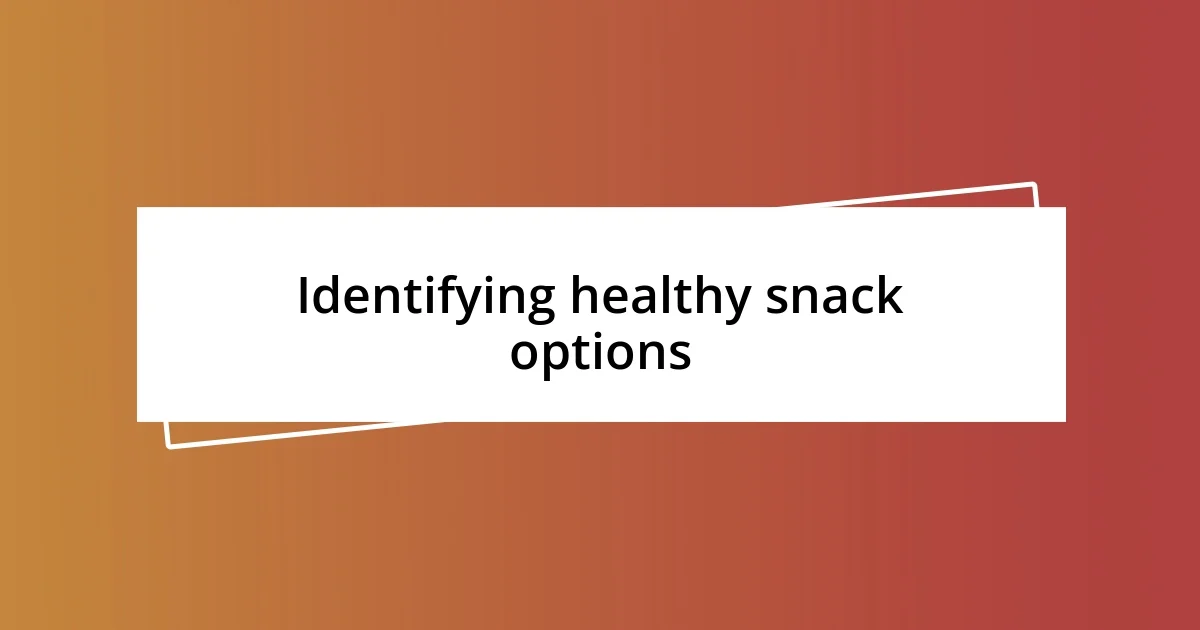
Identifying healthy snack options
Identifying healthy snack options can feel overwhelming with all the choices available. I find that focusing on whole, unprocessed foods can be a game changer. For example, when I swapped out a sugary granola bar for a handful of mixed nuts, not only did I feel more energized, but I also enjoyed the diverse textures and flavors much more. Have you ever felt that excitement when trying a new, healthy option?
It’s important to consider the nutritional content of your snacks. I often check for a balance of protein, healthy fats, and fiber, as these elements keep me feeling full longer. A favorite of mine is Greek yogurt topped with berries. The creaminess of the yogurt paired with the tartness of the berries makes for a delightful combination. Plus, I feel like I’m treating myself while nourishing my body at the same time.
Creating a personal list of healthy snacks can simplify your decisions. I’ve written down a few of my go-to snacks, like hummus with carrot sticks or apple slices with almond butter. Each time I reach for them, I remind myself that I’m making choices that benefit both my body and mind. It’s this conscious decision-making that enriches the entire snacking experience, transforming what once might have been a mindless habit into a deliberate, enjoyable act.
| Healthy Snack Options | Nutritional Benefits |
|---|---|
| Mixed Nuts | Rich in protein, healthy fats, and minerals |
| Greek Yogurt with Berries | High in protein, probiotics, and antioxidants |
| Hummus with Carrot Sticks | Source of fiber and healthy fats |
| Apple Slices with Almond Butter | High in fiber and healthy fats |
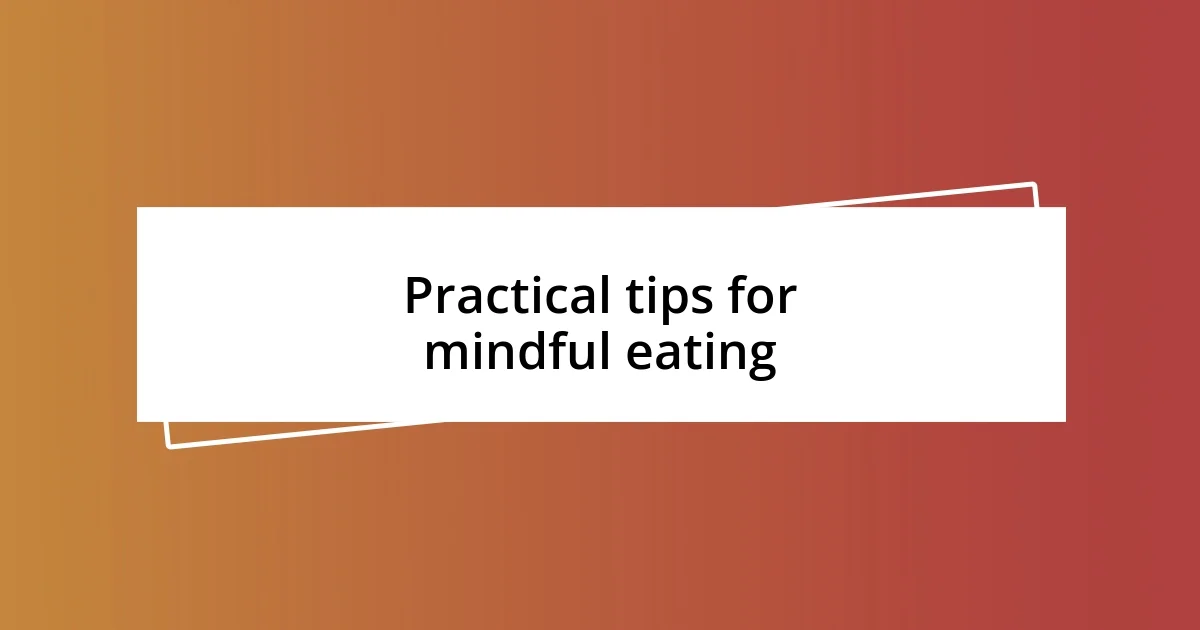
Practical tips for mindful eating
When I think about practical tips for mindful eating, one of the most effective strategies I’ve adopted is to eliminate distractions during snack time. I used to munch on snacks while scrolling through my phone or watching TV, and I realized this made me mindlessly overeat. Now, I set the stage for a mindful moment— I sit at my kitchen table, put my phone away, and focus solely on the food in front of me. This small change transforms my snack into an opportunity to savor each bite, bringing me a greater sense of fulfillment.
Another tip that has truly resonated with me is to engage all my senses while eating. I remember a day when I prepared a simple cucumber and hummus snack. As I took the first bite, I noticed the crunchiness of the cucumber and the smoothness of the hummus. It made me wonder, do we often miss out on these sensory details in our hurried lives? Focusing on the flavors, colors, and textures has deepened my appreciation for food and made snacking a delightful experience rather than just a necessity.
Lastly, I like to practice portion control by using smaller plates or bowls. I’m always on the lookout for ways to visually trick my brain into feeling satisfied. When I fill a smaller dish with popcorn or fruit, it feels like a substantial treat, and it often is enough. Have you ever noticed how serving sizes can impact how full you feel? This approach has encouraged me to listen to my body more, tuning into when I’m genuinely satisfied instead of just mindlessly reaching for seconds.
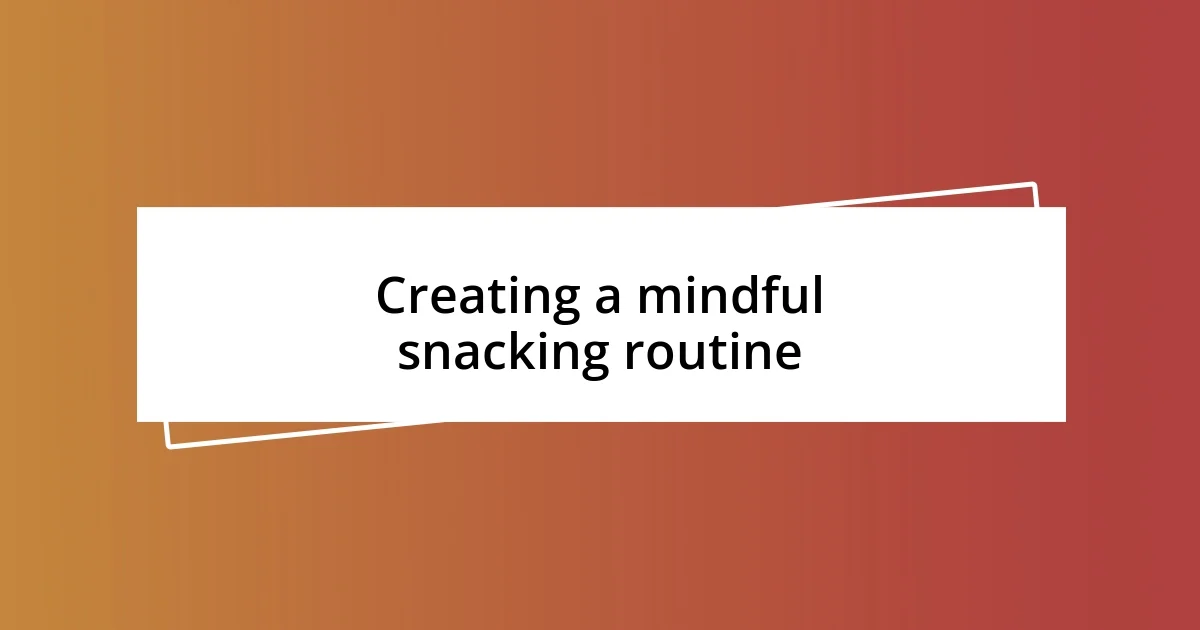
Creating a mindful snacking routine
Creating a mindful snacking routine has made a significant difference in my daily life. One of the first steps I took was designating specific snack times, almost like setting an appointment with myself. This intentionality helps me slow down and truly enjoy my food, rather than grabbing something on the go. Have you ever noticed how much more satisfying it is to snack mindfully rather than munching absentmindedly while multitasking?
I also keep my favorite snacks readily accessible in the kitchen. Having them visible and organized in clear containers serves as a gentle reminder to choose healthier options. I remember feeling excited the first time I arranged my snack drawer that way; it felt like an invitation to nourish myself. When I see those brightly colored fruits and veggies, I can’t help but feel inspired to snack more healthily. How do you store your snacks?
Finally, I’ve learned to associate snacking time with relaxation. Sometimes, I make it a ritual by brewing a cup of herbal tea to accompany my snack. This simple addition transforms my routine into a moment of pause and enjoyment. It’s in these quiet times that I truly connect with what I’m eating. Have you considered how creating a comforting environment around your snacks might enhance your experience? Doing so has turned my usual rush into a peaceful interlude in my day.
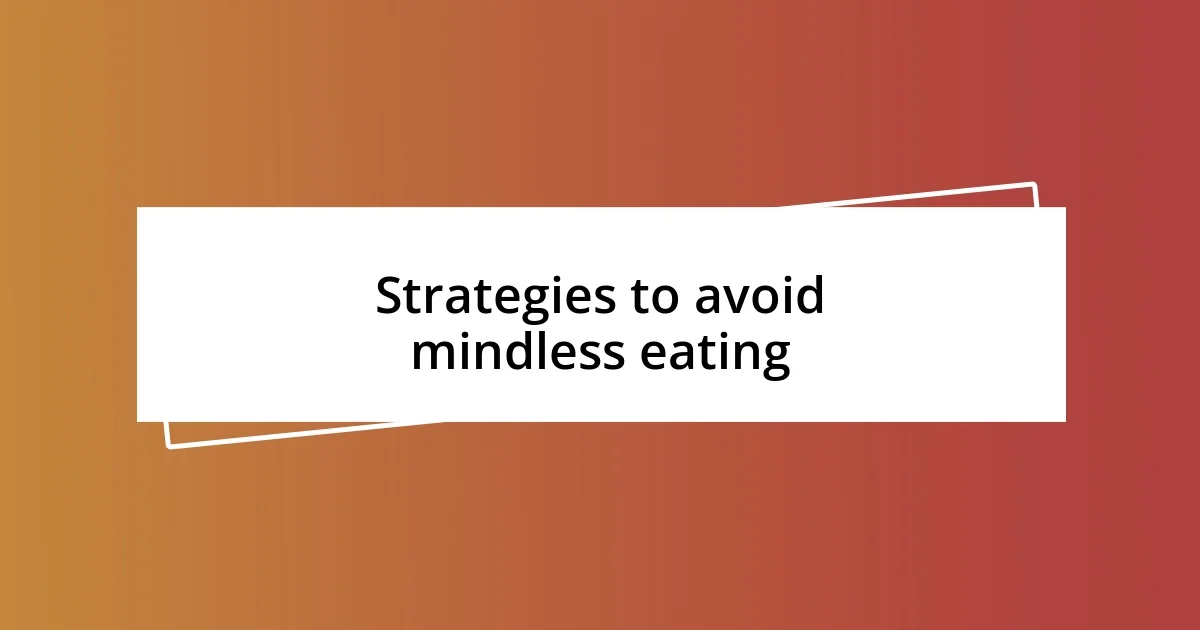
Strategies to avoid mindless eating
It’s incredible how my surroundings can influence my eating habits. One strategy I’ve found particularly effective is rearranging my kitchen space. For example, I used to keep unhealthy snacks at eye level, which was a constant temptation. By placing healthier options front and center, I noticed I gravitated more toward those choices. Have you ever thought about how a simple change in your environment could shift your snacking decisions?
Another approach that’s worked for me is to truly savor my snacks, even while I’m busy. I’ve started setting a timer for five minutes when I have a snack. During that time, I focus completely on what I’m eating, treating it like a mini-meditation session. The first time I did this, I felt almost guilty—why was I giving myself just five minutes? But I soon realized it allowed me to appreciate the flavors and textures so much more. Have you tried dedicating a specific time to enjoy your snack? You might be surprised at how fulfilling it feels.
Then there’s the concept of mindful grocery shopping. I remember being overwhelmed in the snack aisle as I hurriedly tossed in whatever caught my eye. Now, I create a list and stick to it, ensuring I don’t fall for the flashy packaging of less nutritious options. It’s made me feel more in control of my choices, and I actually look forward to snacking on well-thought-out options. Isn’t it empowering to shop with intention? This practice not only helps me avoid mindless snack purchases but also contributes to a healthier lifestyle overall.
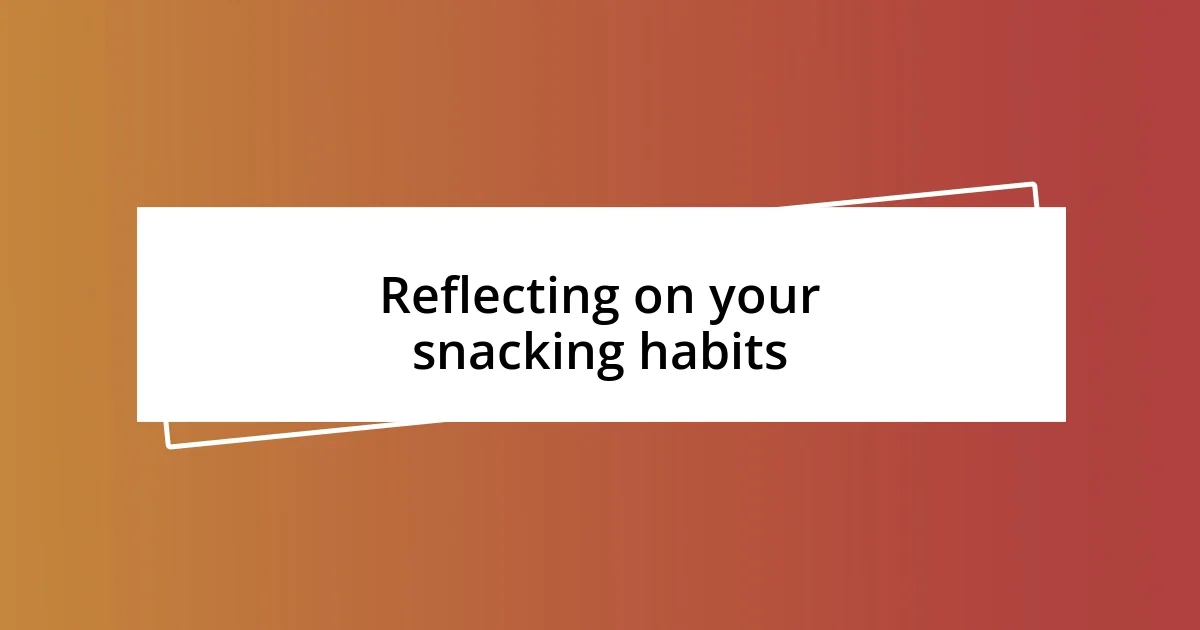
Reflecting on your snacking habits
Reflecting on my snacking habits has been a transformative experience. I often ask myself what triggers my desire to snack—Is it hunger, boredom, or something else? By being honest about my motivations, I’ve discovered that my cravings are sometimes tied to emotional states rather than genuine hunger. This realization has led me to pause and think before reaching for a snack. When was the last time you really considered why you snack?
I remember a particularly enlightening moment when I logged my snacking over a week. It was eye-opening to see patterns emerge, like how I often reached for chips during stressful workdays. I decided to replace that habit with something more nourishing, like a handful of almonds. Reflecting this way doesn’t just help me make better choices; it teaches me about what I need in that moment—comfort, energy, or simply a break. Have you ever tracked your snacking habits and noticed surprising trends?
Astounding insights come from evaluating the setting and timing of my snacks. For instance, I realized that late-night snacking was often linked to watching TV, a cue my brain had learned over time. To break this cycle, I’ve started swapping snacks for soothing herbal tea during those hours. This small change not only curbed my munching but also shifted my focus to relaxation rather than indulgence. How do you think your environment influences your snacking choices? Taking a moment to reflect on this can be a game changer.












